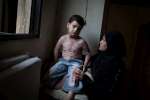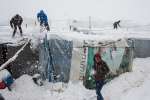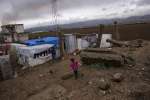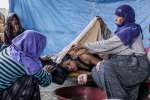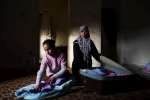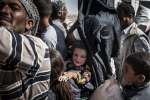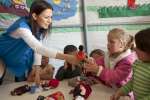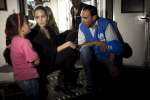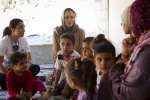- Text size
 |
|  |
|  |
| 
- Français
London Syria Conference: World leaders urged to help Syrians
News Stories, 3 February 2016
LONDON, United Kingdom, Feb 3 (UNHCR) – More than 70 heads of state, the UN Secretary General, heads of international organizations, NGOs and private sector representatives are gathering in London this week for a key conference to pledge their support for the growing aid needs of the Syrian people.
Hosted by the United Kingdom, Germany, Kuwait, Norway and the United Nations, the two-day conference "Supporting Syria and the Region" begins on Wednesday (February 3). It aims to generate significant new help for the immediate and longer-term needs of those affected by the Syrian conflict, including increased funding.
With needs at an unprecedented level, two record UN humanitarian and development appeals amounting to US$7.73 billion were launched this January. The Syria Humanitarian Response Plan (HRP) and the Regional Refugee and Resilience Plan (3RP) represent critical new funding needed to help 22.5 million people in Syria and across the region.
After nearly five years of deadly conflict in Syria, the 3RP seeks to aid an estimated 4.7 million refugees in neighbouring countries by the end of 2016, as well as four million people in the communities hosting them. Equally important is the appeal for continued support for the 13.5 million displaced and conflict-affected people inside Syria itself.
"The lives and futures of millions of Syrian refugees and internally displaced people depend on the world's response. It is imperative that those in positions of power act now. They must spare no effort in bringing an end to the Syrian conflict and generously assist in alleviating the massive human suffering of the Syrian people," said the UN High Commissioner for Refugees Filippo Grandi. "But aid alone will not suffice and we welcome the renewed focus on longer-term solutions for refugees and the communities hosting them."
Since the 3RP was first launched in December 2014, the humanitarian and development situation has deteriorated – both inside Syria, where fighting has intensified, and in neighbouring countries. An estimated quarter of a million Syrians have been killed since 2011, while many refugees across the region have exhausted their resources and are irreversibly sinking into destitution and despair.
With no prospects and no alternatives, thousands of Syrian refugees are embarking on dangerous sea journeys to Europe, risking their lives at the hands of unscrupulous smugglers. Despite these relatively large numbers, it is the host governments and communities neighbouring Syria that continue to bear the brunt of the political, economic and social spillover from the Syria conflict.
UNHCR, the UN Refugee Agency, is increasingly concerned about the growing disparity between the massive humanitarian needs and the international aid available. In 2015, the two appeals for the refugees in the region and the needs inside Syria were funded at just over 50 per cent. More worryingly, considerable contributions arrived only towards the end of the year, ultimately making planning and implementation difficult.
"Given the fact that our appeals have been progressively underfunded, we are asking the international community for increased contributions earlier in the year. It is essential for those of us leading the response to the Syrian refugee crisis to have predictable, multi-year funding, running in parallel with greater support for the main host countries," Grandi said.
The London conference also sets ambitious goals for education and economic opportunities in order to improve and transform the lives of refugees caught up in the Syrian crisis and support neighbouring Lebanon, Jordan, Turkey and Iraq, who are shouldering the heaviest burden of the Syrian displacement.
In addition to increasing the funding for HRP and 3RP; as well as mid-term humanitarian, resilience and development commitments up to 2020, the conference and side events aim to address long-term needs and identify ways in which to strengthen refugee livelihoods and resilience by creating economic opportunities and jobs. Creating education opportunities will be given equal attention.
Crucially, the conference will aim to maintain pressure on parties to the conflict, to protect civilians and to ensure the international community is well prepared to support a coordinated stabilization effort once conditions allow.
The two-day London conference opens on Wednesday (February 3) with civil society events such as the non-governmental and private sector conferences. These events will provide additional input for heads of state focussing on education, livelihoods and protection of the civilian population inside Syria.
After the pledging conferences in Kuwait and Berlin, the London conference is the fourth such event since the start of the Syrian crisis in spring 2011.
By Andrej Mahecic in London


